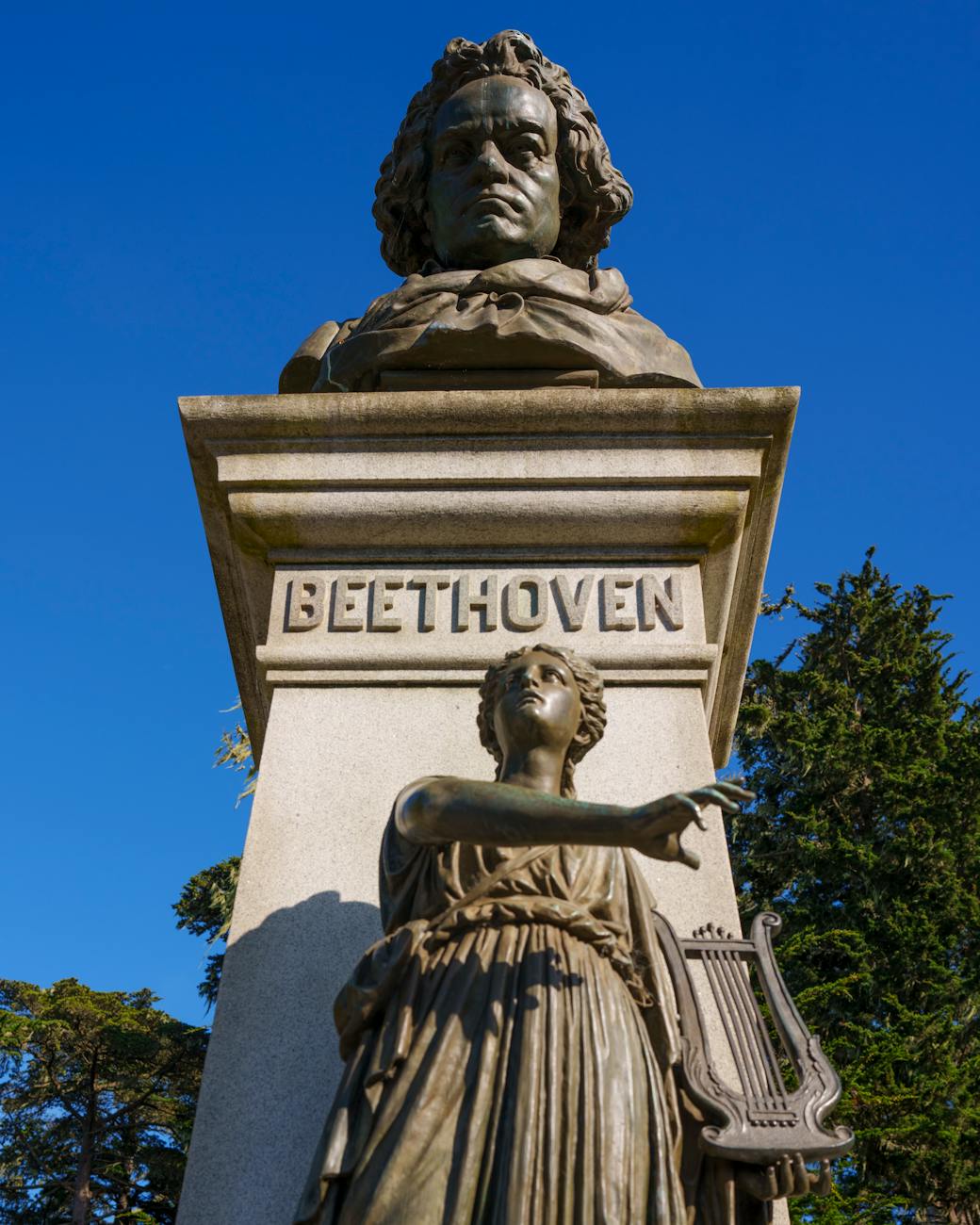Table of Contents
Ludwig van Beethoven: Biography & Symphony Insights
Ludwig van Beethoven stands as one of the most influential figures in the history of Western music. His life and works bridge the gap between the Classical and Romantic eras, showcasing a remarkable evolution in musical composition and expression. This article discusses Beethoven’s biography, the profound impact of his deafness on his compositions, his most famous works, the education that shaped his career, and his enduring legacy in symphony orchestras around the world.

Who Was Ludwig van Beethoven and What Are His Quick Facts?
What are the key events in Ludwig van Beethoven’s biography?
Ludwig van Beethoven was born on March 26, 1770, in Bonn, Germany, to Johann van Beethoven and Maria Magdalena Keverich. His early life was marked by a strict upbringing, as his father, a court organist, recognized his son’s musical talent and sought to exploit it. Beethoven began his formal music education under the guidance of Christian Gottlob Neefe, who introduced him to the works of Haydn and Mozart. By the age of 12, Beethoven was already performing as a pianist and composing his first pieces. In 1792, he left Bonn for Vienna, where he would study under Joseph Haydn and establish his reputation as a virtuoso pianist and composer.
Throughout his life, Beethoven faced numerous challenges, including financial difficulties and personal tragedies, but he continued to compose until his death in 1827, leaving behind a rich legacy of symphonies, sonatas, and concertos.
When and where was Beethoven born?
Beethoven was born in Bonn, a city located in the Holy Roman Empire, which is now part of modern-day Germany. His birthplace played a significant role in his early development as a musician. Bonn was a cultural hub during Beethoven’s youth, and it was here that he first encountered the vibrant musical traditions that would shape his future compositions. The city provided him with access to various musical influences, which he later integrated into his works as he transitioned to Vienna, the epicenter of classical music during his time.
What are some quick facts about Beethoven’s life and career?
Beethoven’s life was characterized by both triumph and adversity. He was a prolific composer, creating over 700 works, including nine symphonies, 32 piano sonatas, and numerous string quartets. His compositions are celebrated for their emotional depth and innovative structures. Despite his growing deafness, which began in his late twenties, Beethoven continued to compose some of his most significant works, including the Ninth Symphony, which features the famous “Ode to Joy.” His ability to transcend his physical limitations and produce masterpieces has solidified his reputation as one of the greatest composers in the history of Western music.
How Did Beethoven’s Deafness Affect His Composition?
What were the early signs of Beethoven’s deafness?
The early signs of Beethoven’s deafness began to manifest in his late twenties. He experienced difficulties hearing high-pitched sounds and often found it challenging to engage in conversations. Initially, he attempted to conceal his hearing loss, fearing it would hinder his career as a pianist and composer. As his condition worsened, Beethoven became increasingly isolated, relying on written communication and the vibrations of music to guide his compositions. This profound deafness, which ultimately rendered him totally deaf, posed significant challenges, yet it also fueled his creative spirit, leading to some of his most innovative works.
How did Beethoven continue to compose despite being totally deaf?
Despite becoming totally deaf, Beethoven continued to compose by relying on his deep understanding of music theory and his ability to visualize sound in his mind. He developed a unique method of composing, using a special rod that he would place in his mouth to feel the vibrations of the piano. This allowed him to “hear” the music internally, enabling him to create complex compositions that resonated with emotional intensity. Beethoven’s determination to compose in the face of adversity is a testament to his passion for music and his unwavering commitment to his art.
What impact did his deafness have on his music style?
Beethoven’s deafness profoundly influenced his music style, leading him to explore new forms and structures. His later works, including the late string quartets and the Ninth Symphony, exhibit a greater sense of introspection and emotional depth. The absence of external auditory feedback allowed him to experiment with unconventional harmonies and innovative orchestration techniques. As a result, Beethoven’s compositions became more expressive and complex, marking a significant departure from the classical norms of his earlier works. His ability to convey profound emotions through music, despite his deafness, has left an indelible mark on the history of classical music.
What Are the Most Famous Works Composed by Beethoven?
What is the significance of the Moonlight Sonata?
One of Beethoven’s most celebrated compositions is the “Moonlight Sonata,” formally known as Piano Sonata No. 14 in C-sharp minor, Op. 27, No. 2. Composed in 1801, this piece is renowned for its lyrical beauty and emotional depth. The first movement, marked “Adagio sostenuto,” evokes a sense of tranquility and introspection, capturing the essence of moonlit nights. The sonata’s popularity has endured through the centuries, making it a staple in the repertoire of pianists worldwide. Its significance lies not only in its musical innovation but also in its ability to resonate with listeners on a deeply emotional level, showcasing Beethoven’s mastery of the piano sonata form.
How did Beethoven’s Ninth Symphony change classical music?
Beethoven’s Ninth Symphony, completed in 1824, represents a monumental achievement in the history of classical music. It was the first symphony to incorporate vocal soloists and a chorus, culminating in the iconic “Ode to Joy.” This groundbreaking work expanded the boundaries of the symphonic form and introduced a new level of emotional expression. The Ninth Symphony’s themes of unity and brotherhood resonate with audiences to this day, making it a powerful anthem for social and political movements. Its influence can be seen in the works of subsequent composers, who drew inspiration from Beethoven’s innovative approach to orchestration and thematic development.
What are some notable string quartets composed by Beethoven?
Beethoven’s contributions to the string quartet repertoire are equally significant, with his late quartets often regarded as some of the most profound works in the genre. Composed during his later years, these quartets, including Op. 127, Op. 130, and Op. 135, showcase his innovative use of form and harmony. They reflect a deep introspection and a departure from traditional structures, allowing for greater emotional expression.
The late string quartets are characterized by their complexity and depth, challenging performers and listeners alike. Beethoven’s mastery of the string quartet form has left a lasting legacy, influencing generations of composers and musicians.
How Did Beethoven’s Education Shape His Career as a Composer?
Who were Beethoven’s main teachers, including Joseph Haydn?
Beethoven’s education played a crucial role in shaping his career as a composer. His early training under Christian Gottlob Neefe laid the foundation for his musical development. However, it was his time in Vienna that truly transformed him into a master composer. In 1792, Beethoven began studying with Joseph Haydn, one of the most prominent composers of the time. Haydn’s influence on Beethoven’s compositional style is evident in his early works, where he adopted elements of the classical form. Additionally, Beethoven studied with other notable musicians, including Antonio Salieri, which further enriched his understanding of music theory and composition.
What role did his time in Bonn and Vienna play in his development?
Beethoven’s time in Bonn and Vienna was instrumental in his development as a composer. In Bonn, he was exposed to a variety of musical influences, including the works of local composers and the emerging classical style. This early exposure helped him cultivate his musical voice. Upon moving to Vienna, Beethoven found himself in a vibrant cultural environment, surrounded by the works of Haydn, Mozart, and other influential figures. This exposure allowed him to refine his compositional techniques and develop his unique style, which would later distinguish him from his contemporaries. The transition from Bonn to Vienna marked a pivotal moment in Beethoven’s career, setting the stage for his emergence as a leading figure in classical music.
How did Beethoven’s early experiences influence his later compositions?
Beethoven’s early experiences significantly influenced his later compositions, shaping his musical identity and thematic choices. The struggles he faced in his youth, including financial hardships and familial pressures, instilled a sense of resilience that permeated his works. His exposure to the musical traditions of Bonn and the innovative spirit of Vienna allowed him to blend classical forms with his emotional depth. Themes of struggle, triumph, and the human experience are prevalent in his compositions, reflecting his personal journey. This ability to convey profound emotions through music has made Beethoven’s works timeless, resonating with audiences across generations.
What Is the Legacy of Ludwig van Beethoven in Symphony Orchestras?
How do modern symphony orchestras perform Beethoven’s works?
Modern symphony orchestras continue to perform Beethoven’s works with great reverence and enthusiasm. His compositions, including symphonies, concertos, and chamber music, are staples in the orchestral repertoire. Conductors and musicians strive to interpret Beethoven’s music with authenticity, often exploring historical performance practices to capture the essence of his compositions. The Ninth Symphony, in particular, is frequently performed at significant cultural events, symbolizing unity and hope. Symphony orchestras around the world celebrate Beethoven’s legacy by presenting his works in innovative ways, ensuring that his music remains relevant and accessible to contemporary audiences.
What is the relevance of Beethoven’s compositions in today’s classical music?
Beethoven’s compositions hold immense relevance in today’s classical music landscape. His innovative approach to form, harmony, and emotional expression has influenced countless composers and musicians. The themes explored in his works, such as struggle, resilience, and the human experience, resonate with audiences across cultures and generations. Beethoven’s music continues to inspire new interpretations and adaptations, bridging the gap between classical and contemporary styles. His ability to convey profound emotions through music ensures that his legacy endures, making him a central figure in the study and performance of classical music.
How has Beethoven influenced other composers and musicians?
Beethoven’s influence on other composers and musicians is immeasurable. His innovative techniques and emotional depth have inspired generations of artists, from Romantic composers like Brahms and Schumann to modern musicians across various genres. Beethoven’s exploration of new forms and structures paved the way for the evolution of classical music, encouraging composers to push the boundaries of their art. His ability to convey complex emotions through music has also resonated with popular musicians, who draw inspiration from his works in their own compositions. The legacy of Ludwig van Beethoven continues to shape the landscape of music, ensuring that his contributions to the art form remain celebrated and cherished.
Additional Reading
More blog posts can be found here. Consider following Breve Music Lessons on Facebook.
